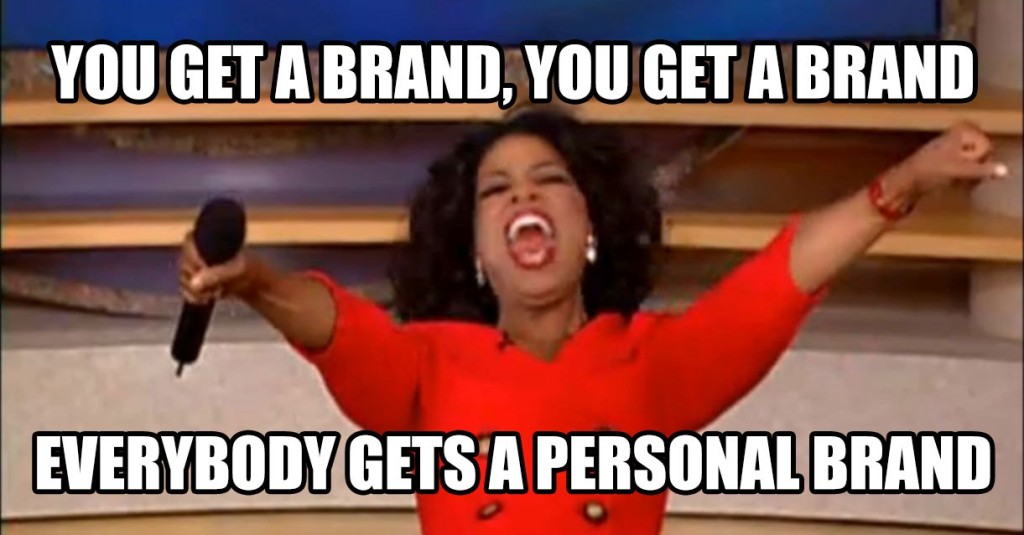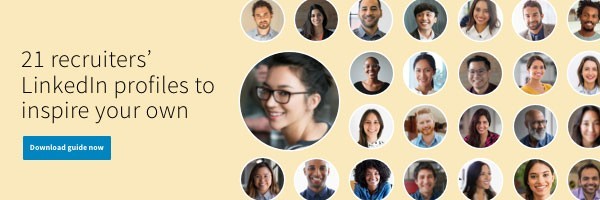How to Build a Personal Brand That Will Impress Even Oprah
When you hear the name Oprah Winfrey, several things spring to mind: her “favorite things,” her book club, and most importantly her openness and empathy. That’s because Oprah’s personal branding game is on point. She’s worked hard to shape the way she’s perceived and developed positive associations with her name.
“Even if you’re not a fan of Oprah, her brand is very strong,” says Jennifer McClure, founder and CEO of Unbridled Talent and DisruptHR. “The integrity and authenticity that she’s developed over the years causes us to think about her and the things she associates with in a positive way.”
Jennifer herself knows a thing or two about the power of personal branding. Her own brand is so strong that people regularly bring her cupcakes at conferences (more on that later). And while a great employer brand can help interest candidates in your company, she argues that your personal brand is often what tips the balance when they decide whether or not to connect.
“What makes you unique compared to other recruiters?” she asks. “You’re competing for top talent. They need to recognize that you have something different and special in addition to your company so that they’ll want to connect with you first.”
Below are seven steps Jennifer shared with the audience at Talent Connect 2018 that will help boost your personal brand.
Step 1: Find out what people think of you, because you already have a personal brand
“You absolutely already have a personal brand, whether you’ve done anything to develop it or not,” Jennifer says. “Because your personal brand is how other people perceive you as compared to people in similar positions.”
To understand what people think of you, Jennifer recommends asking your network to share the three words that spring to mind when they hear your name.
“You have to force people into three words—not sentences, not hyphenated words,” she says. “Take them all, especially the duplicates.”
When you’ve got a list your list of words, Jennifer advises pasting them into a free word cloud generator, like Wordle. The biggest words are the ones used most often to describe you. (Tip: You can also use this trick with your job descriptions to ensure the big themes you want to convey are coming across.)
The biggest word on Jennifer’s word cloud is always cupcakes. That’s because she’s made it her mission to eat a cupcake in every city in the world, so she always shares pictures of them when she’s travelling.
“People associate me with cupcakes—and they bring me cupcakes! So choose wisely!” Jennifer jokes. “But importantly, it shows the power of personal branding and how you have control over it.”
Step 2: Consider what makes you unique to help differentiate your brand
Jennifer once saw a recruiter’s word cloud that was filled with positive words, like caring, smart, and kind. But while this seems ideal on the surface, it represents a somewhat generic personal brand.
“If you got that feedback, that’d make you feel good,” Jennifer says. “But I’d also probably look at that and say there’s not a lot that differentiates her from people. Probably a lot of other executives are described as smart, caring, kind. So maybe she has some work to do to consider what she can start sharing to make her unique.”
As branding expert Sally Hogshead says, “different is better than better.” Jennifer argues that differentiating your personal brand in a positive way may ultimately do more for your career than getting incrementally better at your job. Your job title won’t make people remember you. If you want to stand out, you need to share what makes you memorable.
These differentiating factors can include your skills, education, and interesting companies you’ve worked for, but they can also come from your personal life. For example, beyond cupcakes, Jennifer is also known for her love of horses. When she was a recruiter, candidates would frequently respond to her outreach by telling her they love horses, too.
“It’s a connection point,” she says. “All of those things that you do in your free time that make you uniquely you, your joys outside of work, maybe some of those are ways that you can differentiate yourself as well.”
Step 3: Use your LinkedIn profile to express your unique value proposition
You expect your candidates to have LinkedIn profiles that clearly communicate their talents. That’s why Jennifer finds it strange to see recruiters who don’t do that for themselves.
“I hear recruiters or HR people tell me, ‘me having a completely LinkedIn profile is not important because it’s about my company, not me,’” she says. “[Candidates] may never get to learn about your company if you aren’t representing yourself well.”
Jennifer points out that the two things people look at first are your profile picture and your headline, so it’s crucial to describe yourself in a compelling way—not just as “Recruiter at XYZ.”
“Your goal is basically to create your unique value proposition statement,” she says. “What makes you different from people in similar positions to you? And how do you bring joy and lightness to the world?”
The same rules apply to your summary. Jennifer offers three pieces of wisdom when writing this: don’t ramble, avoid buzzwords, and make it crystal clear what you actually do. You summary should communicate the value you bring, and some of those differentiators from before.
“You have a place to write a summary about yourself where you share your whole self, not just your job and the employer brand proposition of your company,” she says. “You need to make sure that you’re not describing yourself the same way that everyone else does.”
Step 4: Develop a quick and engaging pitch to describe your brand to others
Your online presence is important, but you also need to communicate your personal brand quickly in conversation. Jennifer has developed a free “personal brand workbook” to help you craft an engaging statement about yourself and what you bring to the table. You can also fill out this simple formula mad-libs style:
I am [your role] who helps [your audience] do or understand [unique offering] so that [transformation and benefit].
When you’ve written your pitch, Jennifer has an acronym, BRAND, to help you assess whether it’s up to par:
- BOLD: your pitch should show how you change the world
- RELEVANT: your pitch needs to relate to what you actually do
- AUTHENTIC: your pitch can be aspirational, but you have to live up to it
- NOTABLE AND EASY TO UNDERSTAND: your pitch should be concise and memorable, making people want to know more
- DIFFERENTIATED: remember, different is better than better
Step 5: Communicate what you want to be known for across your social media channels
Your brand is what you make of it. If you want people to think about you in a certain way, you can influence that by sharing specific content.
“If you are not known today for something you would like to be known for, start talking about it,” Jennifer says. “Start writing about it, start sharing about it on your social media feeds, start making your coworkers aware that it’s an interest of yours, because for them to associate it with you, it starts with you.”
The easiest way to do this is by sharing and creating content that represents your brand across all the social media platforms that you use. It also creates more people to discover you, since they will find you through your content.
“To quote Jayson DeMers, Founder and CEO of AudienceBloom: If content is the fuel for your personal brand, then social media is the engine,” says Jennifer. “So use LinkedIn, use Twitter, use Instagram, use Facebook—wherever you hang out, whether the talent you want to recruit hangs out, share your thoughts, your expertise.
To increase your audience, build credibility, and gain influence, you can also consider doing talks, like Jennifer does! While she acknowledges this isn’t for everyone, moderating a discussion or being part of a panel can take some of the pressure off.
“Get yourself up where you’re sharing your expertise on a bigger stage,” she says.
Step 6: Share your wisdom and increase your credibility by mentoring others
Another strategy to build credibility is to mentor others. By sharing your knowledge, you invite people to recognize you as an expert in what you do.
“Don’t wait to be asked,” Jennifer says. “Find some people that you can mentor.”
Earlier in her career, Jennifer dedicated 10% of her time to helping senior executives transition into different jobs.
“We’d talk about their interviewing skills and go over their resume, and then I started showing them how to use LinkedIn,” she reflects. “They loved that so much that once they got hired and became CEOs or VPs or salespeople at their organization they said Jennifer, won’t you come in and teach my employees to do that?”
Mentoring is as beneficial to you as it is to the people you help. Just look at Jennifer. Today, she travels the world sharing her knowledge, just like she always wanted. The time she invested in building her personal brand paid off in spades.
“To me, personal branding is about career management,” she says. “[It’s] a really important part of getting where you want to go in your career.”
Step 7: As you evolve as a person, make sure your personal brand evolves with you
Personal branding is not a one-and-done deal. Throughout your career, it’s important to keep refining your brand to ensure it still aligns with your achievements and goals.
Jennifer says she tries to look critically at her brand at least twice a year, checking in on the three words people associate with her, and ensuring her LinkedIn profile still represents her.
“You’re different today than you were two years ago,” she points out. “You’re at a different place in your career. If you’re in the same place, that is unique in itself. So you are always evolving, and your personal brand statement should always be evolving.”
Final thoughts: your personal brand is your opportunity to be thought of as THE go-to person in your field
Building your personal brand takes time, effort, and a little elbow grease, but it can pay off in many different ways.
“Start thinking about you can position yourself so that you can get recognized and noticed for the opportunities that you want, and also help your company recruit talent because your brand is a strong brand that people want to be associated with,” says Jennifer.
If you brand yourself well enough, eventually, you might become the go-to name on everyone’s lips. Different is better than better, but being the Oprah of recruiting is best of all.
“The most powerful word in personal branding is ‘the,’” Jennifer says. “When you are THE person that people need to talk to, [...] then your personal brand is on fire.”
To receive blog posts like this one straight in your inbox, subscribe to the blog newsletter.
Topics: Recruiting tips
Related articles



